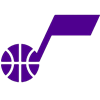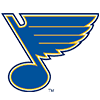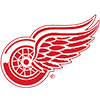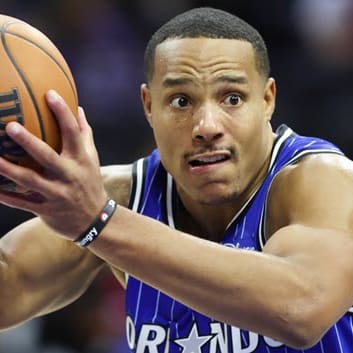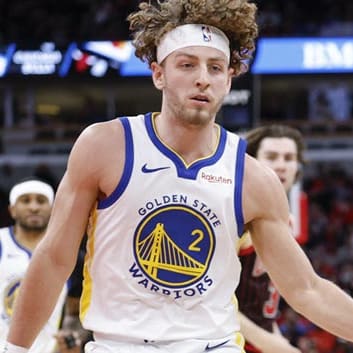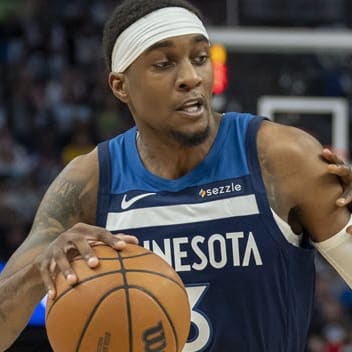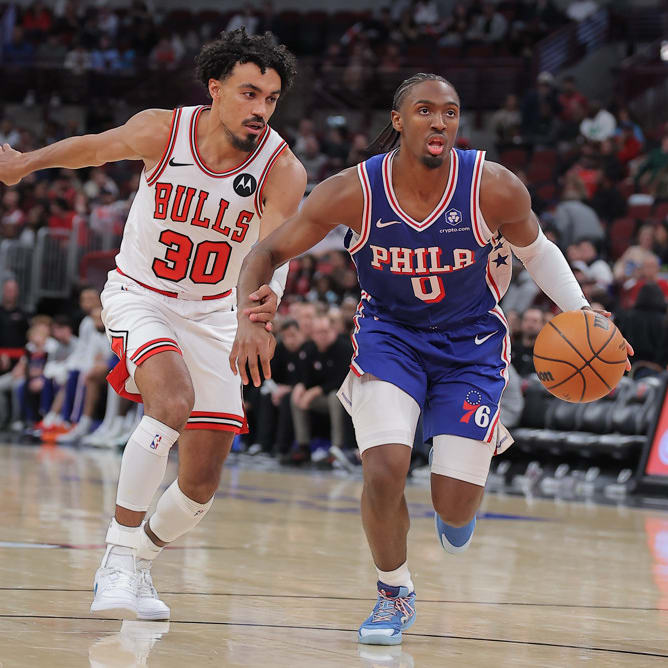While COVID-19 continues to result in absences and postponements around the league, injuries have also befallen some big-name players over the last week. Athletic trainer Jeff Stotts (@InStreetClothes) takes an in-depth look at what lies ahead for CJ McCollum, Jusuf Nurkic, Myles Turner, and other fantasy-relevant players.
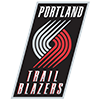 CJ McCollum and Jusuf Nurkic
CJ McCollum and Jusuf Nurkic
The Blazers lost two members of their starting five to bone-related injuries in a span of two days. Nurkic was injured first, suffering a right wrist fracture. McCollum was injured in Portland's next game, suffering a mid-foot sprain and a broken lateral cuneiform in his left foot.
Nurkic sustained a wrist fracture in a recent loss to the Pacers when he swiped at the ball. X-rays revealed the break and surgery was performed January 19 in Los Angeles. Nurkic is expected to miss at least the next six weeks.
When a bone fractures, the nature of the break and the bone involved are two primary factors that influence treatment options. Surgery is usually warranted if the bone fragments are displaced, meaning they have shifted out of normal alignment. Additionally, a trip to the operating room may be necessary if the bone itself has a limited blood supply and may have trouble adequately fusing.
In Nurkic's case it is likely he suffered a displaced fracture, setting up the need for his surgery. On the plus side, bone tissue usually heals nicely and is capable of returning to its original strength and integrity. However, this takes time
While COVID-19 continues to result in absences and postponements around the league, injuries have also befallen some big-name players over the last week. Athletic trainer Jeff Stotts (@InStreetClothes) takes an in-depth look at what lies ahead for CJ McCollum, Jusuf Nurkic, Myles Turner, and other fantasy-relevant players.
 CJ McCollum and Jusuf Nurkic
CJ McCollum and Jusuf Nurkic
The Blazers lost two members of their starting five to bone-related injuries in a span of two days. Nurkic was injured first, suffering a right wrist fracture. McCollum was injured in Portland's next game, suffering a mid-foot sprain and a broken lateral cuneiform in his left foot.
Nurkic sustained a wrist fracture in a recent loss to the Pacers when he swiped at the ball. X-rays revealed the break and surgery was performed January 19 in Los Angeles. Nurkic is expected to miss at least the next six weeks.
When a bone fractures, the nature of the break and the bone involved are two primary factors that influence treatment options. Surgery is usually warranted if the bone fragments are displaced, meaning they have shifted out of normal alignment. Additionally, a trip to the operating room may be necessary if the bone itself has a limited blood supply and may have trouble adequately fusing.
In Nurkic's case it is likely he suffered a displaced fracture, setting up the need for his surgery. On the plus side, bone tissue usually heals nicely and is capable of returning to its original strength and integrity. However, this takes time and NBA players who suffered in-season wrist fractures that require surgery miss an average of 32 games -- or roughly eight weeks. As a result, it wouldn't be shocking to see Nurkic's recovery extend beyond the estimated timeline.
In the meantime, Enes Kanter becomes the starting center for the Blazers and should see a bump in fantasy value. Kanter averaged 18.1 points and 11.4 rebounds as a starter for the Blazers in the 2018-19 season, numbers he's come close to replicating in his two starts since Nurkic went down.
McCollum's injury is a bit more complex. The foot is made up of 20 individual bones and 33 different joints and articulations. McCollum's injury occurred in the middle of the foot at the apex of the arch. Here, the five metatarsals, cuboid and the three cuneiform bones form the mid-foot. The lateral cuneiform sits below the middle toe at the base of the third metatarsal. Its positioning allows the lateral cuneiform to act as an anchor point for multiple ligaments and tendons and to articulate with six other bones in the area. The location of the cuneiforms often protects them from trauma, making an isolated fracture a unique and relatively rare injury. Even when the cuneiforms are damaged, it is more common to suffer a fracture to the medial cuneiform.
McCollum will likely spend the next four weeks in a walking boot to create an environment more conducive to healing. As long as the injury site remains stable and is able to adequately heal, McCollum should be able to avoid surgery. However, if the fragments do not sufficiently fuse or become displaced, like in the case of Nurkic, surgical intervention may become necessary. Furthermore, time will also be needed to allow the ligament(s) involved in his mid-foot sprain to heal. As a result, a four-to-six week recovery is possible, but a six-to-eight week timeframe may be more realistic for a return to basketball.
Rodney Hood replaced McCollum in the starting lineup and scored a season-high 21 points in his first outing. He won't offer the rebounds or assists that McCollum does, but he could be a decent plug-and-play option for managers looking for some short-term scoring.
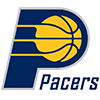 T.J. Warren and Myles Turner
T.J. Warren and Myles Turner
The Pacers are dealing with their own fair share of bone injuries. Warren is currently sidelined with a navicular stress fracture that required surgery in early January.
Unlike Nurkic and McCollum, Warren's injury is not an acute break but a stress-related fracture. When a bone is routinely loaded in a particular manner, the body naturally responds by fortifying and remodeling the bone. Unfortunately, the bone tissue can fail and a fracture can occur if the stress applied outweighs the rate of the remodeling.
For Warren, his stress fracture occurred in the navicular, one of the tiny tarsal bones of the mid-foot. The bone plays a crucial role in weight transfer and force absorption generated during ground impact. Surgery is often needed for fractures to the bone, based on its overall limited blood supply. Recovery is often lengthy and has sidelined multiple players for significant stretches, including Joel Embiid, both Pau and Marc Gasol, and even Michael Jordan. The Pacers have not provided a definitive timeline for his recovery but do expect him to miss a substantial part of the regular season. It would not be shocking, based on previous cases, to see Warren sit for the remainder of the season.
Warren's loss will be offset by the return of Jeremy Lamb. Last season, Lamb suffered a complex knee injury that included a torn anterior cruciate ligament (ACL) and lateral meniscus and a lateral femoral condyle fracture. Lamb scored 10 points in 19 minutes in his season debut on Wednesday and should slowly be worked back into the rotation. He may receive routine days off as part of his return to play program but is worth a flier in most fantasy formats.
The Pacers frontcourt is also missing Turner who has been sidelined for two straight outings with a fractured right hand. The fracture has been diagnosed as a small avulsion fracture. An avulsion fracture occurs when a ligament or tendon pulls away a small part of bone instead of tearing itself. In Turner's case the bone fragment appears to have been non-displaced as the team has said he will not require a trip under the knife. Turner's absence should be brief, easing further strain on the depleted Pacers. In the meantime, Doug McDermott will remain a part of the starting unit and see an increase in minutes.
Fast Breaks
Lonzo Ball: While LaMelo is the leading candidate for Rookie of the Year, the oldest Ball brother is struggling in his fourth year in the league. His shooting remains elusive and he is averaging career-lows in rebounds, assists, and steals. Ball has also missed multiple games with bilateral knee tendinopathies. A tendinopathy is simply trauma to a tendon that has the possibility of developing into a more problematic, chronic issue. While Lonzo has returned to the court, the chances of a flare up or reoccurrence will linger for the immediate future. Given his inconsistent play on the court, assuming this level of risk may be unwise and it's probably best to send him to the waiver wire if you need the roster space.
Caris LeVert: Indiana discovered a tiny mass on LeVert's kidney during the physical required to complete their trade with Brooklyn. LeVert has been ruled out indefinitely while additional tests are run. Issues like this are a good reminder for fantasy managers that these players are real people vulnerable to serious medical concerns. Best wishes to LeVert and his family during the weeks ahead.
COVID-19 cases: The pandemic continues to impact the NBA with multiple players contracting the coronavirus. Seth Curry, Jayson Tatum, Michael Porter Jr, and Karl-Anthony Towns are just a few of the confirmed cases in the league so far. Any player who tests positive must complete the league's mandated return-to-play protocol. So far, players who have entered the protocol have missed an average of two-to-three weeks.















